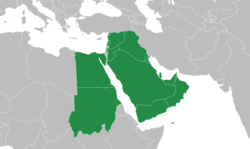The Mashriq (/məˈʃriːk/; Arabic: ْاَلْمَشْرِق, romanized: al-Mashriq, lit. 'the east'), also known as the Arab Mashriq (Arabic: اَلْمَشْرِقُ الْعَرَبِيُّ, romanized: al-Mashriq al-ʿArabi, lit. 'the Arab east'), sometimes spelled Mashreq or Mashrek, is a term used by Arabs to refer to the eastern part of the Arab world, as opposed to the Maghreb (western) region, and located in Western Asia and eastern North Africa.[1] It is the Arabic equivalent for the term Middle East.[2] Poetically the "Place of Sunrise", the name is derived from the verb sharaqa (َشَرَق, "to shine, illuminate, radiate" and "to rise"), from the sh-r-q root (ش-ر-ق), referring to the east, where the sun rises.[3][4]
| Mashriq المشرق | |
|---|---|
 | |
| Countries and territories | |
The region includes the Arab-majority states of Bahrain, Egypt, Iraq, Jordan, Kuwait, Lebanon, the eastern part of Libya, Oman, Qatar, Saudi Arabia, the State of Palestine, Syria, the United Arab Emirates and Yemen.[2][5][6][7]
Geography
editAs the word Mashriq refers to Arab countries located between the Mediterranean Sea and Iran, it is the companion term to Maghreb (Arabic: المغرب), the western half of the Arab world comprising Algeria, Morocco, Tunisia and western Libya. Libya may be regarded as straddling the two regions. Cyrenaica in eastern Libya is considered part of the Mashriq, whereas Tripolitania in western Libya is considered part of the Maghreb. Therefore Sirtica or the Gulf of Sidra is considered the dividing point between the Maghreb and Mashreq within the Arab world.[6][7]
These geographical terms date from the early Islamic expansion. The Mashriq corresponds to the Bilad al-Sham and Mesopotamian regions combined.[12] As of 2014[update], the Mashriq is home to 1.7% of the global population.[13][14][15][16][17][18]
Cooperation
editAll of the countries located in the Arab Mashreq area are members of the Arab League, the Greater Arab Free Trade Area, and the United Nations. The region cooperates in several projects including the Arab Mashreq International Road Network and the Arab Mashreq International Railway. Several nations are also members of the GCC and others have tried to achieve political unity in the past, such as the United Arab Republic in the 1960s and 1970s, which originally included both Egypt and Syria.
See also
edit- Arabia Felix
- Arabian Peninsula
- Cradle of civilization
- Fertile Crescent
- Levant
- Maghreb, "Place of Sunset", which contrasts with Mashriq, "Place of Sunrise"
- Mashriqi Arabic
- Mashriqi Jews
- Nile
- Shaam (Greater Syria)
References
edit- ^ "Economic interrogation in the mashriq" (PDF). world bank, siteresources.
- ^ a b Everett-Heath, John (2018). The Concise Dictionary of World Place-Names (4th ed.). Oxford: Oxford University Press. ISBN 978-0-19-186632-6. OCLC 1053905476.
- ^ Alvarez, Lourdes María (2009). Abu Al-Ḥasan Al-Shushtarī. Paulist Press. p. 157. ISBN 978-0-8091-0582-3.
- ^ Peek, Philip M.; Yankah, Kwesi (2003-12-12). African Folklore: An Encyclopedia. Routledge. p. 442. ISBN 978-1-135-94873-3.
- ^ "Mashriq | geographical region, Middle East". Encyclopedia Britannica. Retrieved 2021-08-16.
- ^ a b "Libya - Geography". www.country-data.com. Retrieved 2023-06-12.
- ^ a b Le Gall, Michel; Perkins, Kenneth (2010). The Maghrib in Question: Essays in History and Historiography. University of Texas Press. p. 8. ISBN 978-0-292-78838-1.
- ^ "About ANPGR". www.aoad.org. Arab Network of Plant Genetic Resources.[dead link]
- ^ "Mashreq". www.aarinena.org. Association of Agricultural Research Institutions in the Near East & North Africa. Archived from the original on 2017-02-24. Retrieved 2016-05-02.
- ^ ""السلفية في المشرق العربي" من كتاب "الحركات الإسلامية في الوطن العربي" | مدونة جدران". www.judran.net. Archived from the original on March 4, 2016. Retrieved August 19, 2015.
- ^ "لماذا يستثنى الأردن من التقسيم؟ الوضع الداخلي هو العنصر الحاسم*فهد الخيطان" [Why is Jordan exempted from the division? The internal situation is a critical component * Fahd strings]. rasseen.com (in Arabic). Rasseen. 2014-07-13.
- ^ Clancy-Smith, Julia (2013-11-05). North Africa, Islam and the Mediterranean World. Routledge. p. 98. ISBN 978-1-135-31213-8.
- ^ Official estimate of the Population of Egypt Archived May 25, 2013, at the Wayback Machine
- ^ UN estimate for Lebanon
- ^ "Official Jordanian population clock". Archived from the original on January 17, 2012.
- ^ "National Main Statistical Indicators". State of Palestine – Palestinian Central Bureau of Statistics. Archived from the original on 2016-12-03. Retrieved 2016-05-02.
- ^ UN estimate for Syria
- ^ "Iraq". The World Bank. Retrieved 2023-12-21.